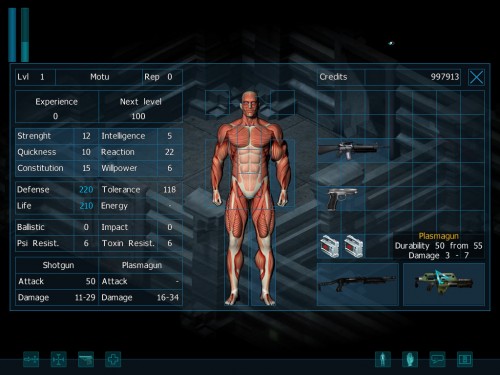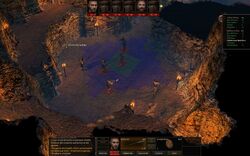Restricted Area Skills part 1 - Background & Attributes
Restricted Area Skills part 1 - Background & Attributes
Codex Preview - posted by Saint_Proverbius on Thu 10 July 2003, 09:34:31
Tags: Jan Beuck; Master Creating; Restricted Area<div align="Center">The Restricted Area Skill System</div>
In my opinion, skills are maybe the main point which separates the different characters. Of course they have different attribute values (like physical strength etc.), a different personality and a different look, but nothing has so much impact on the gameplay as the way you develop your character though skills. The extensive skill system is a major feature of Restricted Area. It is very important to us, as several action-RPGs in the past failed because they didn't spend enough time on their skill system, although it's the thing that truly separates the different characters and motivates to play on or even again with different ones. The skills are what not only makes them different, but the game experience. That's why - once again in my opinion - RPGs with no or nearly no skills aren't much fun and have nearly no replay value. To understand the way skills work and why they are important to create a better game experience we should take a look at some other game mechanics first.
A major feature in every RPG is experience, as this is one of the key motivations to play the game. The player character gets experience points for dispatching enemies and also for completing quests and finding secrets. For a certain amount of experience he receives a level up, the experience needed to get the next level up is always higher than the last one - nothing new to you I guess. The highest achievable level is 100. We choose to set a limit as this helps to balance the characters and it's an interesting goal for very advanced players which have done "everything else", but it's so high that we don't expect someone to reach it during the first months. After a level up you get 10 so-called development points for your skills and you may increase an attribute of your choice by 1. We decided to make attribute points rare as in reality it's easier to learn a new ability as it is to increase your basic attributes. Attributes reach from your characters starting value (3 would be a "normal" human, but they are a little better) to 5 times this value, while all skills start with level 0 and can be increased until they reach level 10.
Attributes
The Restricted Area characters have six main attributes, separated into three (more or less) physical and three (more or less) mental. All have various influences on the game, here are just the most important ones:Physical Attributes
Strength represents the amount of physical damage with melee weapons and the minimum requirements of heavy weapons.
Dexterity represents your chance to hit an enemy and the minimum requirements of weapons which are complex to use.
Constitution represents general health and resistance to injury and pain. The character's life points are based on it.
Mental Attributes
Intelligence represents the overall quickness of mind, aptitude, and the ability to perceive surroundings. It is not knowledge. The values energy (PSI), reaction in Cyberspace and minimum requirements of cyberspace programs are based on the character's intelligence.
Reaction represents your quickness and agility and is especially important to evade attacks. This means it replaces the armour value of most fantasy RPGs.
Willpower represents mental stability and the will to resist certain kinds of mental and fatigue damage. For example your PSI resistance is based on the willpower attribute.
Additionally there are several other character values (like reputation), but they don't directly effect the skill system.
Each character has 15 unique skills, fitting to his background and his potential. Unique really means unique - it was very important to us that there are no similar skills at all (for example, if one character has a skill that increases his attack speed, he has no other skill that effects the attack speed at all and no other character has a skill like this as well). I think this is very important as nobody needs 10 skills of each kind that do basically the same thing, maybe with a slightly different graphical effect, but somehow that's very common. It was also very important to us that there are no skills which become worthless once you may learn a better one! All skills stay useful forever and no development point can ever be spend "wrong", except maybe for your personal opinion.
Once we decided to go this way, we noticed that some skills we would like to create are not character-specific and should be accessible by all characters. To archive this, we created a miscellaneous skill tree with 15 additional skills that can be learned by all characters. The "skill trees" are structured like pyramids, with five level one skills on the ground, four level two skills above them and so on, until there's one level five skill on top.
To learn a skill higher than level one you need to learn the two skill on which it's icon seems to stand before. Usually they have a logical relationship, like you need to learn how to use simple explosive grenades and flashbang grenades before you may learn how to use more complex EMP grenades. The higher the level of a skill already is, the more expensive it is to learn the next level.
Let's take a look at the numbers:
1. You get 10 skill development points per level
2. To learn a new level of a skill costs new skill level + level of the skill + 1
This means, you need 3 points to learn a level 1 skill on 1 (resulting in that when reaching level 1 with your character you can decide between learning 3 level 1 skills at 1 or 1 level 1 skill at 2). The other extreme, learning a level 5 skill on 10, would cost you 16 development points. This doesn't not sound very much, but wait? this means you need to save the points of an entire level-up and add more than the half of the next. As level 5 skills at level 10 aren't available early (simply because you need to learn all other skills in that tree at least at level 1 and the level 5 skill at level 9) and the time between two level ups enlarges every time you get one it means you probably have to wait very long until you can finally enjoy the satisfaction of perfection.
Some final words:
If you are familiar with RPGs this all sounds simple, but it took very long until the attribute system, the experience system and the skill system really worked seamlessly together. I don't know how long we discussed it, but I know for sure that we meet us five times "for the very last time" to decide about the skill system and each time we were sure to find the perfect solution - and five times we throw away everything we had thought of in the past and started from zero. When I was young(er) I managed LARP events (live RPGs) and wrote several rulesets for pen-and-paper RPGs for me and my friends. I thought it would be easy to create an original ruleset for a CRPG as well, but it wasn't.
A big problem was the different audience, reaching from people which want a real RPG with all possibilities of a pen-and-paper RPG to others which just want to kill some mutants and don't want to bother long with a complex character system each time they receive a level up. Well, maybe most even are like me and belong to both groups...
Another big problem we wanted to avoid have been high numbers. When playing a pen-and-paper RPG you can take your time to calculate new values and play around with different possibilities for your next level up - sometimes thinking about the values of your character takes longer than the actual adventure, but it can be very fun and interesting. In a CRPG the decisions are (usually) permanent and can't be tried out first or changed back later, so we did everything to keep all numbers low and therefore overviewable. This required a lot of balancing, so I guess the best point about the Restricted Area skill system are the things you can't see, as you don't need to see them.
Big hoopla to Jan Beuck of master-creating for taking the time to work on this series of articles about the character system of Restricted Area! Thanks, Jan!
There are 7 comments on Restricted Area Skills part 1 - Background & Attributes














